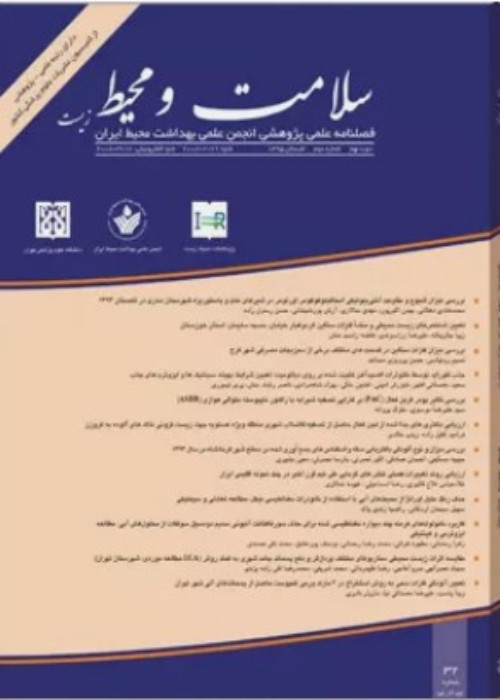A review of studies on burden of disease attributable to environmental risk factors in Iran: achievements, limitations and future plans
Author(s):
Article Type:
Research/Original Article (دارای رتبه معتبر)
Abstract:
Background and Objective
Environmental burden of disease (EBD) studies are one of the most important needs for determining the current situation, increasing the effectiveness of health policies and programs and prioritizing environmental health interventions. This review article was evaluated the status of the EBD in Iran based on the results of the latest Global Burden of Disease (GBD) Study, other international studies and national estimates in the country.
Materials and Methods
In this study, the researches on the EBD in Iran were identified by searching in the international and national scientific databases and the search results were studied and analyzed.
Results
The review of the EBD studies showed that based on the results of the GBD study, the share of environmental risk factors in the total burden of diseases in the country in 2017 according to the disability-adjusted life years (DALYs) and deaths were about 8 and 13%, respectively. According to the results of the GBD study, the contributions of environmental risk factors in the attributable DALYs in the country in 2017 (a total value of 1,648,329) were as follows: ambient air PM2.5 for 45.0%, occupational risk factors for 25.1%, exposure to lead for 19.4%, unsafe water source for 5.0%, tropospheric ozone for 1.7%, lack of access to handwashing facility for 1.5%, unsafe sanitation for 1.4%, residential radon for 0.6%, and household air pollution from solid fuels for 0.3%. The total DALY rate and death rate attributable to solar ultraviolet radiation in Iran in 2000 were estimated to be 46.2 and 0.7, respectively. The DALY and the DALY rate attributable to elevated levels of fluoride in drinking water due to dental fluorosis in the country in 2017 were 3,443 and 4.14, respectively. The evaluation of the effect of water fluoridation as an environmental protective factor showed that the intervention by reducing the risk of dental caries could fall the DALY and DALY rates in the country by 14,971 and 18.73, respectively. In the period of 2005-2017, the DALY rate (per 100,000 people) attributable to ambient air PM2.5, tropospheric ozone, residential radon, and occupational risk factors rose that the result increases the importance of the preventive measures and controls of these risk factors.
Conclusion
There was a considerable difference in the burden of disease attributed to each risk factor in various international studies as well as between national and international studies. The results of national studies on the burden of diseases attributable to environmental risk factors are considered to be more reliable and practical due to the application of more detailed data and conducting subnational evaluations; therefore, the strengthening and continuing these studies at the national and sub-national levels with regard to priorities, needs, and spatiotemporal trends using domestic reliable data and information are necessary and strictly recommended.Keywords:
Language:
Persian
Published:
Iranian Journal of Health and Environment, Volume:12 Issue: 2, 2019
Pages:
319 to 350
magiran.com/p2021601
دانلود و مطالعه متن این مقاله با یکی از روشهای زیر امکان پذیر است:
اشتراک شخصی
با عضویت و پرداخت آنلاین حق اشتراک یکساله به مبلغ 1,390,000ريال میتوانید 70 عنوان مطلب دانلود کنید!
اشتراک سازمانی
به کتابخانه دانشگاه یا محل کار خود پیشنهاد کنید تا اشتراک سازمانی این پایگاه را برای دسترسی نامحدود همه کاربران به متن مطالب تهیه نمایند!
توجه!
- حق عضویت دریافتی صرف حمایت از نشریات عضو و نگهداری، تکمیل و توسعه مگیران میشود.
- پرداخت حق اشتراک و دانلود مقالات اجازه بازنشر آن در سایر رسانههای چاپی و دیجیتال را به کاربر نمیدهد.
In order to view content subscription is required
Personal subscription
Subscribe magiran.com for 70 € euros via PayPal and download 70 articles during a year.
Organization subscription
Please contact us to subscribe your university or library for unlimited access!


